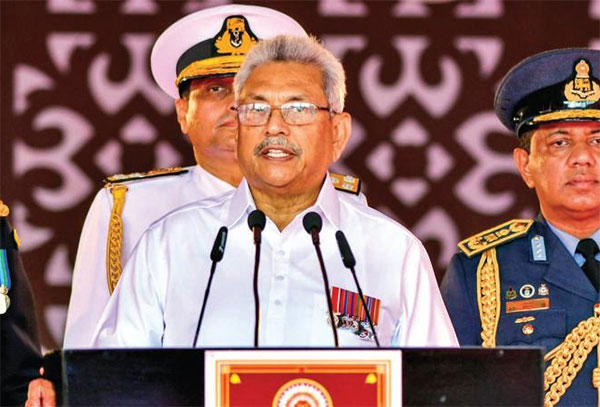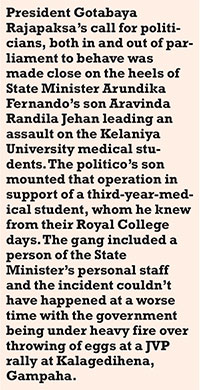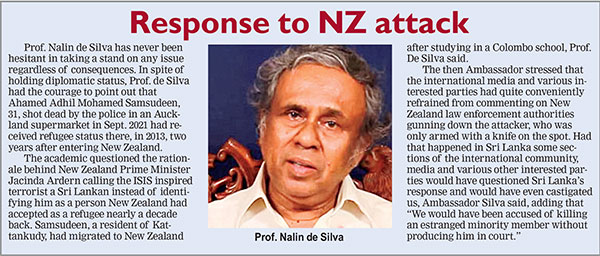SPECIAL REPORT : Part 406
By Shamindra Ferdinando
Prof. Nalin de Silva has questioned the absence of a ‘mechanism’ to implement President Gotabaya Rajapaksa’s strategies. The academic, in his regular piece in Sinhala posted online on Feb 5 discussed the limitations against the backdrop of President Rajapaksa’s address to the nation on Independence Day.
In another commentary, posted online the following day, Prof. de Silva explained that the Feb 5 article should be also examined along with views expressed on January 31 and Feb 2. Essentially, Prof. de Silva compared the system now in place with that of President Ranasinghe Premadasa (1989-1993). Prof. de Silva argued that Premadasa, in spite of securing the presidency without the backing of political elites, was able to take control of the mechanism required to implement his strategies whereas Rajapaksa so far couldn’t. Prof. de Silva declared that President Rajapaksa’s failure to have a system of his own is nothing but a tragedy.
It would be pertinent to mention that Prof. de Silva, in mid-September 2021, quit the ambassadorial position that he received, courtesy the Sri Lanka Podujana Peramuna (SLPP) administration. Having presented the Letter of Credence to Myanmar President Win Myint on 01 Sept. 2020 at the Presidential palace in Nay Pyi Taw, Prof. de Silva served for a year. The outspoken academic returned home after having received treatment for Covid-19 infection.
Declaring that he gave up the diplomatic posting as he found it difficult to continue there especially after being treated for Covid-19, Prof. de Silva emphasised that his resignation was not in any way connected with a wave of resignations at the time.
Since Prof. de Silva quit his Myanmar assignment, there had been so many resignations. Perhaps the most serious of them all is Dr. P.B. Jayasundera’s exit in mid-January 2022. Punchi Banda Wijesundera, or PBJ, resigned as Secretary to the President under controversial circumstances. The writer dealt with the issue and the troubles experienced by the Rajapaksa administration in ‘Can Dr. PBJ alone be blamed for the current crises?’ in last week’s Midweek column.
It would be pertinent to mention that Prof. de Silva, in March 2021, indicated his desire to resign in the wake of prolonged detention of a group of Sri Lankan fishers detained in Myanmar. Unfortunately, a section of the media quite pathetically failed to comprehend de Silva’s message.
By the time Prof. de Silva quit his ambassadorial post in Sept 2021, President Gotabaya Rajapaksa had brought in Prof. G.L. Peiris, who is also the Chairman of the SLPP, as his Foreign Minister in place of Dinesh Gunawardena, leader of the Mahajana Eksath Peramuna (MEP).
There had never been so many resignations during a two-year period of any previous administration. Prof. de Silva’s resignation should be examined against the backdrop of his role in promoting wartime Defence Secretary as the SLPP candidate at the 2019 presidential election. The academic had been one of the few who vigorously campaigned for Gotabaya Rajapaksa at a time the vast majority of those now holding positions weren’t so certain, whereas some objected to the Gajaba Regiment combat veteran’s entry into politics.
Another good speech
Prof. de Silva’s assessment of President Gotabaya Rajapaksa’s Independence Day address to the nation deliberated on an issue that had considerably weakened the government. Declaring that the President had delivered another good speech that dealt with the rights as well as the responsibilities of individuals and the responsibility on the part of the members of Parliament to behave, Prof. de Silva questioned the absence of an efficient mechanism to ensure the implementation of the President’s objectives.
Assuring his readiness to give proper leadership, the President requested ministers, parliamentarians and other politicians to act in an exemplary manner at all times. “If you set this example to the people, then the majority of the people will follow you,” the President’s Media Division quoted Gotabaya Rajapaksa as having said.
Prof.de Silva said in the absence of a much required mechanism to implement the President’s vision, such good views expressed by the leader has been restricted to just speeches. The controversial academic, known to fight tooth and nail for what he believes in, emphasised that his stance shouldn’t be considered in any way as the President is not honest against the backdrop of a lack of proper strategy implementing mechanism.
While speculating whether the President had been deprived of a mechanism as someone else controlled it or perhaps no one was in control, Prof. de Silva said that he tended to accept the second reason though some believed otherwise.
Reiterating that today no one exercised the exclusive control over the existing mechanism, Prof. de Silva asserted that though Gotabaya Rajapaksa served as the executive President, he didn’t have the power in Parliament. Did the academic express the belief, that the 145-member strong SLPP parliamentary group operated totally outside the President’s purview? Obviously, the academic made this assessment taking into consideration as he pointed out that the President was not the leader of any political party. Prof. de Silva expressed the view that though the people elected Gotabaya Rajapaksa as the President, he lacked political support due to him not being engaged in politics among the public. The former university mathematics don asserted that much touted political programme ‘Gama Samaga Pilisandarak’ could not be a substitute for grassroots level campaign involving the President.
Prof. de Silva did not mince his words when he declared the country was in deepening turmoil due to those in authority pulling in different directions. Making reference to public servants operating outside the purview of political leadership, the academic pointed out the absence of a consensus between Finance Minister Basil Rajapaksa and Central Bank Governor Ajith Nivard Cabraal, Agriculture Minister Mahindananda Aluthgamage not having control over ministry officials , Premier Mahinda Rajapaksa’s inability to rein in the Buddha Sasana ministry and the latter promoting the Netherlands’ interests. The former Ambassador declared that turmoil was endemic and certainly not restricted to the ministries and institutions mentioned above.
Prof. de Silva asked whether the President should accept responsibility for the current situation. The academic wondered whether the President no longer enjoyed the powers he had as the Defence Secretary during the war.
Prof. de Silva’s incisive comments in the wake of the President’s Independence Day address to the nation are a must read. The academic dealt with past Presidents, leaving out Dingiri Banda Wijetunga, who served assassinated leader Ranasinghe Premadasa’s remaining term. Let me translate really a thought provoking paragraph exactly the way Prof. de Silva commented on the incumbent President and his predecessors sans Wijetunga, who served as the President from May 1993 to Nov 1994. Chandrika Bandaranaike Kumaratunga succeeded him. Prof. de Silva said: “Is the President responsible for the current situation? The President seems to have been deprived of the powers he enjoyed as the Secretary, Ministry of Defence. Of all executive Presidents, JRJ abused powers badly. He postponed elections. He entered into the Indo-Lanka accord in spite of countrywide opposition. He obtained undated resignation letters from lawmakers. Only Premadasa hadn’t been scared of JRJ. Perhaps Gamini Dissanayake, too, hadn’t been intimidated by JRJ as GD felt he could be the President with Indian backing. Premadasa had the power to threaten JRJ at the latter’s Ward Place residence though he lacked the backing of political elites. How did Premadasa acquire such power?”
Prof. de Silva asserted that there hadn’t been a proper assessment or study of Premadasa. The academic propagated the hypothesis that both CBK and Ranil Wickremesinghe hadn’t been able to achieve what Premadasa did though both enjoyed Western backing in addition to their family support. Mahinda Rajapaksa accomplished some success though he couldn’t even come closer to Premadasa whereas Maithripala Sirisena failed to make any impression.
Prof. de Silva also dealt with the breaking up of the UNP, abortive bid to impeach Premadasa, formation of the Democratic United National Front (DUNF) by a dissident group led by ex-UNP powerful ministers Gamini Dissanayake and Lalith Athulathmudali and their subsequent assassinations, in separate incidents blamed on the LTTE and the failure on the part of Sajith Premadasa, in his capacity as the leader of the Samagi Jana Balavegaya (SJB), to follow in the footsteps of his illustrious father.
Comment on 13A
Even during his one year tenure as Sri Lanka’s top envoy in Myanmar, Prof. de Silva took a public stand on controversial issues. In January last year, just five months after taking over the Myanmar mission, Prof. Silva flayed India for its interference in Sri Lanka’s domestic affairs. In an open letter in Sinhala, also sent to The Island, Prof. de Silva questioned what he called Indian interventions in post-war Sri Lanka and a bid to exploit the Covid-19 pandemic.
The then Ambassador asked whether India offered Sri Lanka Covid-19 vaccine in return for the full implementation of the 13th Amendment to the Constitution enacted in the late 80s at the behest of New Delhi though that piece of legislation is irrelevant today.
Referring to Indian External Affairs Minister Dr. S. Jaishankar’s visit to Colombo where he met President Gotabaya Rajapaksa, Opposition Leader Sajith Premadasa, TNA delegation and UNP leader Ranil Wickremesinghe, the academic questioned the Indian strategy. At the conclusion of the meetings, Dr. Jaishankar declared: “It is in Sri Lanka’s own interest that the expectations of the Tamil people for equality, justice, peace and dignity within a united Sri Lanka are fulfilled. That applies equally to the commitments made by the Sri Lankan government on meaningful devolution, including the 13th Amendment to the Constitution.”
Commenting on Sri Lanka’s efforts to procure Covid-19 vaccine, Jaishankar said, “We are now looking at post-Covid cooperation and I carry back with me Sri Lanka’s interest in accessing vaccines from India and I shared with the Foreign Minister, as Prime Minister Modi has said, India sees international cooperation in this area as its duty.”
Expressing serious concern over strong Indian presence in Colombo, ex-Ambassador de Silva queried whether the Indian External Affairs Ministry was situated in Colombo. The non-career diplomat also compared the effectiveness of the vaccine that could be obtained from India and serum available for those countries having the wherewithal to secure, store and implement the large scale vaccination campaign.
Ambassador de Silva, a vociferous supporter of ongoing local efforts to develop Sri Lankan remedy for Covid-19 epidemic, pointed out the failure on the part of the country as a whole to support domestic bids.
The strong patriot asked whether Dr. Jaishankar visited Colombo to inform the government of its readiness to provide vaccines and give priority to Sri Lanka. Pointing out that Sri Lanka would get some vaccines, though it lacked understanding of India’s requirement as it struggled to overcome Covid-19, Ambassador de Silva said that Sri Lanka should have sought an explanation from Dr. Jaishankar whether India didn’t have a local remedy.
Prof. de Silva launched a scathing attack over India’s call to further strengthen the Provincial Council system. The senior academic said: “Indian External Affairs Minister wants Sri Lanka to strengthen the Provincial Council system further. Why should we do that? The so-called Tamil problem had been solved. Even if the issue hadn’t been resolved, what right did India have to intervene in domestic issues? We have no issue in TNA leader R. Sampanthan, MP, and lawmaker M.A. Sumanthiran taking up residence at India House, situated opposite the University of Colombo. India cannot be allowed to meddle here to appease the likes of Sampanthan and Sumanthiran.”
Asserting the irrelevance of the so-called Tamil problem in the wake of the eradication of the LTTE military capability in May 2009 on the banks of the Nanthikadal lagoon, Ambassador de Silva said that the terrorist challenge could only have been neutralized through military means. In spite of those who had spearheaded the Jathika Hela Urumaya at its inception campaigning against the war effort, the military succeeded in eradicating the enemy’s conventional military capability for once and for all, the nationalist said.
Pointing out how Canada and the UK still facilitated those bent on dividing the country on ethnic lines by propagating a totally fabricated genocide that never happened; Ambassador de Silva alleged that the government hadn’t taken tangible measures to counter the enemy strategy.
Prof de Silva questioned how India expected Sri Lanka to fulfil what then President JR Jayewardene promised against the backdrop of New Delhi’s failure to disarm the LTTE in terms of the Indo-Lanka accord. Sri Lanka shouldn’t under any circumstances give into Indian demands as regards the 13th Amendment in return for a stock of Covid-19 vaccines, Ambassador de Silva said.
The former Mathematics don also discussed the continuing controversy over the alleged Memorandum of Cooperation (MoC) among Sri Lanka, India and Japan in respect of the East Container Terminal (ECT) at the Colombo harbour entered into by the yahapalana regime. The then Sri Lanka envoy in Myanmar urged the government to take the parliament and the public into confidence if it intended to finalise agreement on ECT
Following strong protests by port unions against giving ECT to India it was handed back to SLPA. Since then India’s Adani Group has secured the right to develop the West Container Terminal (WCT) of the Colombo Port. Adani has signed an agreement with the Sri Lanka Ports Authority (SLPA) and John Keells Holdings to develop the WCT. Valued at more than $700m, this build-operate-transfer (BOT) agreement is said to be the ‘largest’ foreign investment ever in Sri Lanka’s port sector. The agreement will remain valid for 35 years.
Sri Lanka finalised a dubious Yugadanavi deal soon after Prof. de Silva returned from Rangoon. The Yugadanavi deal has been challenged in the Supreme Court with three ministers taking the side of those who petitioned the SC against the Sept 17 agreement. The government has caused further controversy by entering into a fresh agreement with New Delhi in respect of the Trincomalee oil tank farm.
Academic de Silva, during his tenure in Rangoon also called for the abolition of the Provincial Councils. The declaration was made in the wake of some interested parties, including a section of the government pushing for PC polls. New Delhi has even raised the 13th Amendment at the UNHRC thereby underscored the pivotal importance of the high profile Gandhi era project from the 80s.
If the government is genuinely interested in achieving success at least during the remaining period as repeatedly assured by the SLPP as well as the President, let there be a reappraisal of the situation, proper assessment and tangible measures to address the issues at hand. The SLPP can begin by perusing Prof. de Silva’s analysis of the current political situation.


 It would be pertinent to mention that Prof. de Silva, in mid-September 2021, quit the ambassadorial position that he received, courtesy the Sri Lanka Podujana Peramuna (SLPP) administration. Having presented the Letter of Credence to Myanmar President Win Myint on 01 Sept. 2020 at the Presidential palace in Nay Pyi Taw, Prof. de Silva served for a year. The outspoken academic returned home after having received treatment for Covid-19 infection.
It would be pertinent to mention that Prof. de Silva, in mid-September 2021, quit the ambassadorial position that he received, courtesy the Sri Lanka Podujana Peramuna (SLPP) administration. Having presented the Letter of Credence to Myanmar President Win Myint on 01 Sept. 2020 at the Presidential palace in Nay Pyi Taw, Prof. de Silva served for a year. The outspoken academic returned home after having received treatment for Covid-19 infection. Even during his one year tenure as Sri Lanka’s top envoy in Myanmar, Prof. de Silva took a public stand on controversial issues. In January last year, just five months after taking over the Myanmar mission, Prof. Silva flayed India for its interference in Sri Lanka’s domestic affairs. In an open letter in Sinhala, also sent to The Island, Prof. de Silva questioned what he called Indian interventions in post-war Sri Lanka and a bid to exploit the Covid-19 pandemic.
Even during his one year tenure as Sri Lanka’s top envoy in Myanmar, Prof. de Silva took a public stand on controversial issues. In January last year, just five months after taking over the Myanmar mission, Prof. Silva flayed India for its interference in Sri Lanka’s domestic affairs. In an open letter in Sinhala, also sent to The Island, Prof. de Silva questioned what he called Indian interventions in post-war Sri Lanka and a bid to exploit the Covid-19 pandemic.